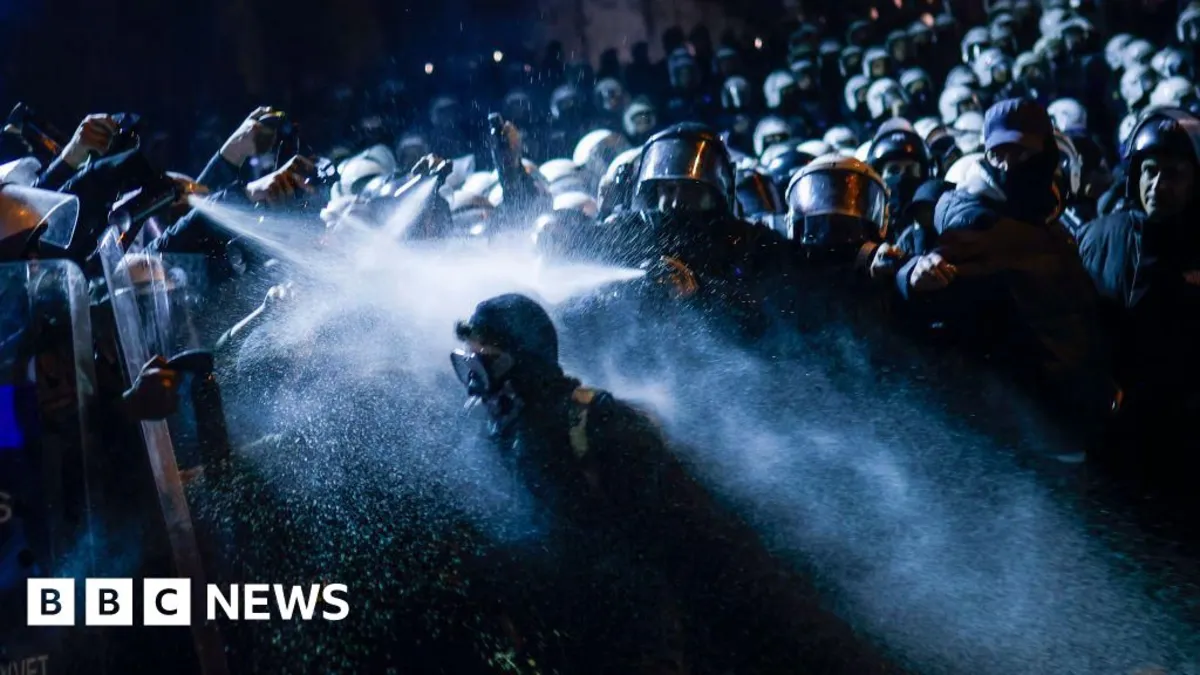
Beneath the acrid smell of tear gas that fills the night air in Istanbul, there is a palpable sense of panic emanating from Turkey's long-time leader, Recep Tayyip Erdogan. The recent jailing of Ekrem Imamoglu, the popular mayor of Istanbul, is not just another political maneuver; it suggests that President Erdogan may be feeling the pressure. While the detention of political rivals is not a new phenomenon in Turkey, the circumstances surrounding Imamoglu's imprisonment indicate a turning point that could have significant ramifications for the future of Turkish politics.
Ekrem Imamoglu, known for his sharp attire and charismatic presence, has emerged as the main rival to Erdogan’s increasingly authoritarian regime. As a key figure in the opposition Republican People's Party (CHP), Imamoglu has the potential to challenge Erdogan in the upcoming presidential elections slated for 2028, provided he is free to run. His popularity has drawn vast crowds onto the streets, signaling a critical moment for Turkish democracy.
This situation is not merely a dispute over the fate of Istanbul's mayor. It symbolizes a broader struggle against the erosion of freedom and democracy that has characterized Erdogan's time in office. Many citizens view this as an opportunity to halt the country's descent into autocracy, and they are willing to risk arrest and violence to make their voices heard. Since the protests began, more than 1,000 individuals have been detained within just five days, highlighting the precarious nature of dissent in Turkey.
Turkey presents itself as a functioning democracy, boasting regular elections and high voter turnout. However, the reality is far more complex. While voting may appear fair on the surface, the atmosphere surrounding elections is fraught with intimidation and repression. Opposition politicians face imprisonment, critics are silenced, and the media is predominantly government-controlled. The moment polling day arrives, a flood of pro-government coverage overshadows any opposition voices, effectively skewing the democratic process.
Imamoglu stands out as a politician capable of breaking through the barriers erected by the Erdogan administration. With three successful elections as mayor of Istanbul under his belt, he now faces serious accusations, including embezzlement and running a criminal organization. If convicted, he risks not only imprisonment but also being barred from participating in the presidential race. Currently, he is appealing a previous conviction that resulted in a two-year prison sentence for insulting election officials.
Turkey's government insists that its judiciary operates independently and in accordance with the law. However, both human rights activists and independent analysts are skeptical of this claim. Organizations like Human Rights Watch have criticized the politically motivated nature of Imamoglu's detention, deeming it a tactic to suppress lawful political activities. The international community is closely watching these developments, as they could have significant implications for Turkey's standing in global politics.
Imamoglu, with his significant following on social media—over 9.6 million on X—has declared that the charges against him tarnish Turkey's democratic image. He has vowed to remain steadfast in the face of oppression, a quality that could be worrisome for Erdogan. As protests continue to escalate, they present a formidable challenge to the president's authority. The question remains: how long before Erdogan's security forces resort to more violent measures to quell dissent? The potential for tragedy looms large, as the breaking point for any strongman regime can often come unexpectedly.
In the coming days and weeks, both the protesters and the Erdogan administration will face significant challenges. While the opposition aims to maintain momentum, Erdogan still commands a loyal base of supporters and control over the majority of state resources. He may be banking on public fatigue from protests as citizens shift their focus back to pressing economic issues, such as soaring inflation, which stood at 39% in February, and the declining value of the Turkish lira.
The outcome of this standoff will test the resilience of both sides. Drawing from lessons learned in other authoritarian contexts, a swift resolution appears unlikely, leaving Turkey at a critical juncture in its struggle for democracy.